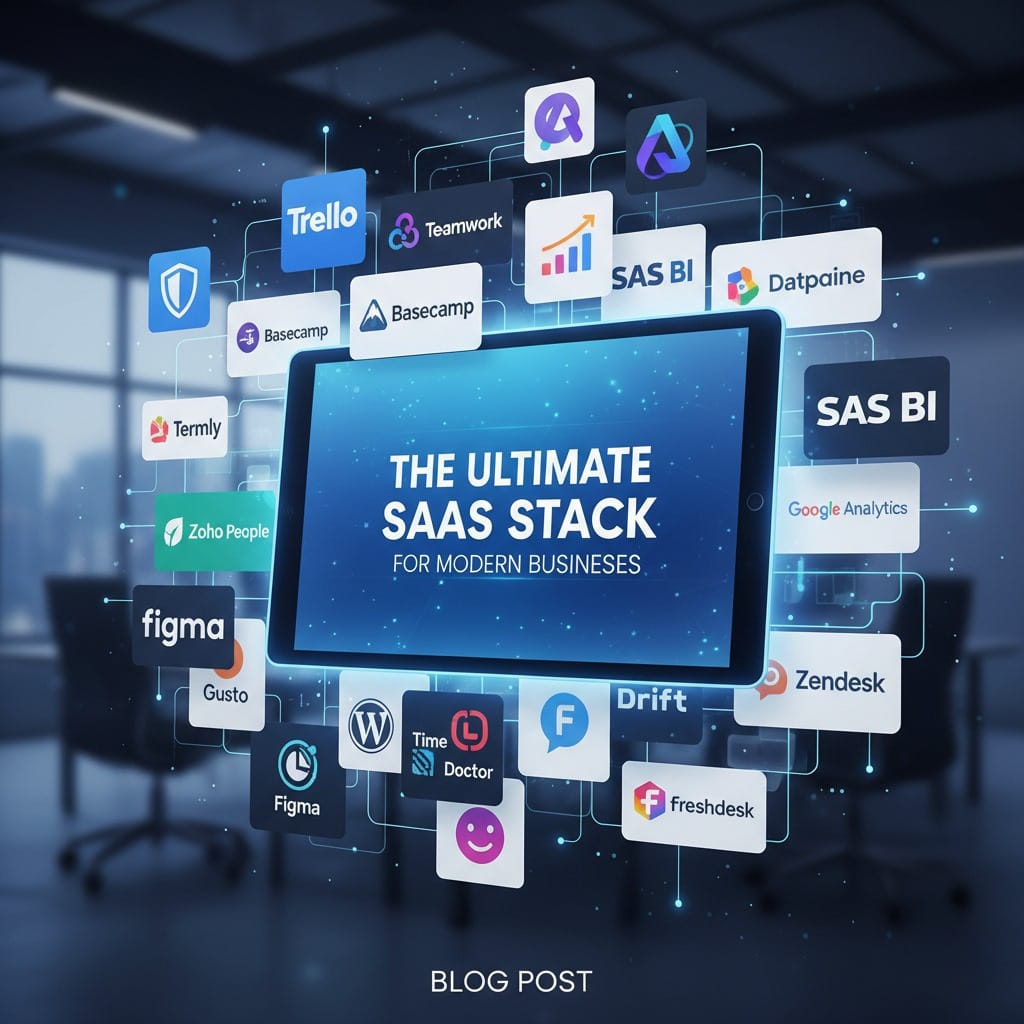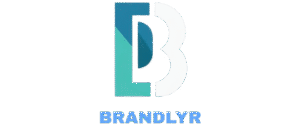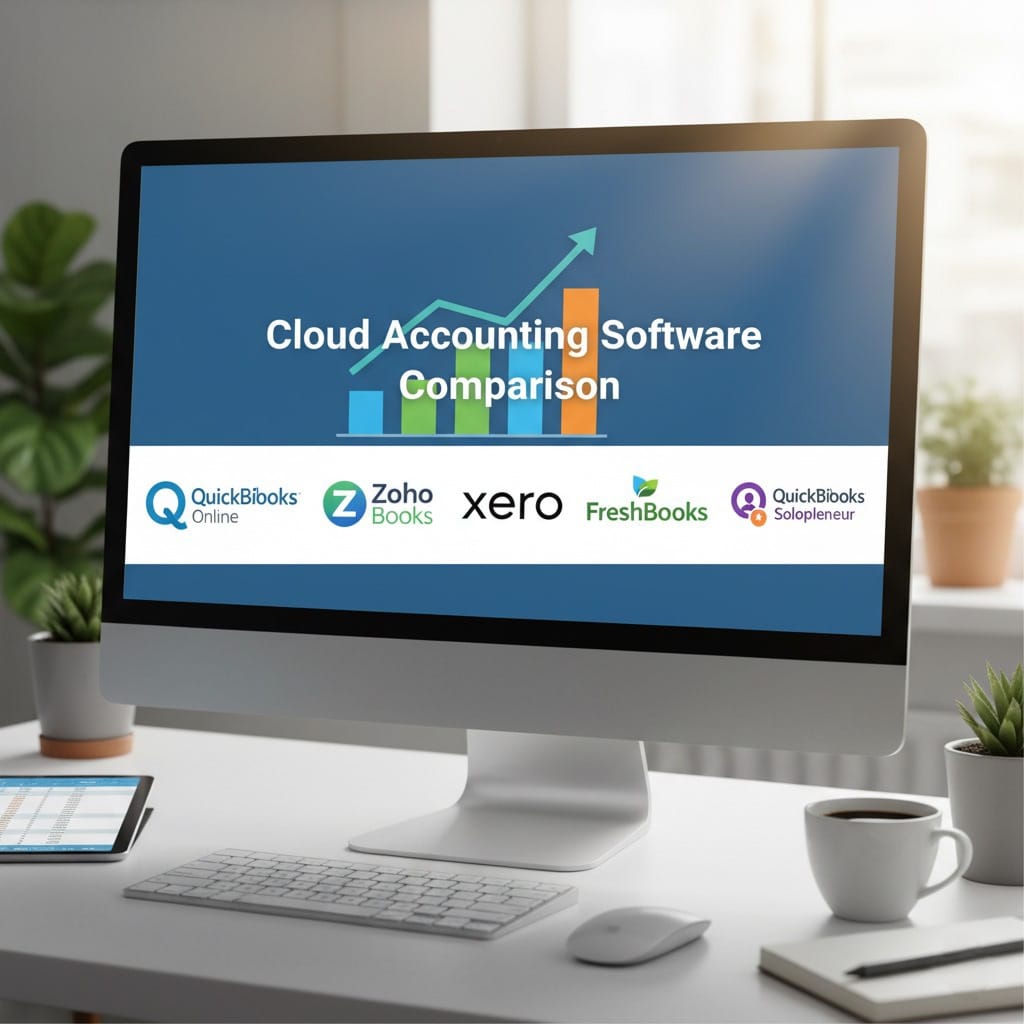26 Brilliant SaaS Tools Businesses in 2025 Technology is changing the way we work. In 2025, SaaS tools (Software as a Service)
26 Brilliant SaaS Tools Businesses in 2025

Technology is changing the way we work. In 2025, SaaS tools (Software as a Service) have become the heart of every successful business.
Whether you are running a small startup or a big company, these tools help you save time, reduce costs, and grow faster.
You don’t need to download big software or hire huge teams. Just use the internet — and your favorite SaaS tools will handle the rest.
🧠 What Are SaaS Tools?

SaaS means “Software as a Service.”
In simple words, these are online software programs that you can use through your web browser.
You don’t need to install them.
You just log in, and they are ready to use anytime, anywhere.
Examples of SaaS tools include Google Docs, Canva, Zoom, and Shopify.
✅ Benefits of Using SaaS Tools
- No need for installation or hardware
- Pay only for what you use
- Access from any device
- Regular updates and security
- Great for remote teams
💼 Why Your Business Needs SaaS in 2025
In 2025, businesses move faster than ever.
You need to manage projects, data, employees, customers, and websites — all at once.
SaaS tools make this easy.
They help you automate tasks, track performance, and communicate better with your team and clients.
Even if you’re not a tech expert, you can still use these tools easily because most SaaS apps have simple dashboards and drag-and-drop features.
🧩 Types of SaaS Tools
We have divided our list into 5 main types:
- Project Management Tools
- Data & Analytics Tools
- Human Resources Tools
- Website Tools
- Customer Support Tools
Let’s explore each category and find out which SaaS tools can help your business grow in 2025.
🗂️ Project Management Tools
Every company runs projects — marketing, product design, sales, and more.
Project management tools help you plan, assign, and track tasks so your team stays organized.
Here are 5 best project management SaaS tools for 2025:
1. Trello
Trello is one of the most popular tools for managing projects visually.
It uses a Kanban board — a simple drag-and-drop system where you can move tasks between columns like To Do, Doing, and Done.
✅ Key Features:
- Easy drag-and-drop cards
- Color-coded task labels
- Add deadlines and checklists
- Assign tasks to team members
- Mobile-friendly app
Best for: Small teams and creative projects.
2. Asana
Asana helps teams stay on track with clear goals and timelines.
You can manage multiple projects in one place and track everyone’s progress.
✅ Key Features:
- Ready-made project templates
- Calendar, list, and timeline views
- Task automation
- Team collaboration tools
- Custom fields for tracking work
Best for: Medium to large teams managing complex workflows.
3. Teamwork
Trusted by big brands like Disney and Spotify, Teamwork focuses on both collaboration and time tracking.
It also helps you control budgets and resources easily.
✅ Key Features:
- Task & workload management
- Time tracking and reporting
- Client access portal
- Project milestones and templates
- Integration with apps like Slack and Google Drive
Best for: Agencies and remote teams.
4. SmartTask
SmartTask is an all-in-one platform that mixes project management with CRM (Customer Relationship Management).
You can manage sales, marketing, and customer data — all in one place.
✅ Key Features:
- Portfolio and timeline views
- Automation & reminders
- Task priorities and milestones
- Built-in chat and communication tools
- CRM and sales tracking
Best for: Growing startups with multiple departments.
5. Basecamp
Basecamp is perfect for small businesses that want simple project tracking.
It combines task lists, messaging, and file sharing — all in one clean dashboard.
✅ Key Features:
- To-do lists and task reminders
- Group chat and direct messages
- File storage and sharing
- Email notifications
- Progress tracking dashboard
Best for: Small teams that want an easy and stress-free project tool.
📊 Data & Analytics Tools
Every business runs on data.
But raw data means nothing unless you turn it into useful insights.
That’s where analytics tools help. They show you what’s working — and what’s not.
Here are 6 smart SaaS tools for data and analytics in 2025:
- Termly
If your business runs online, you must follow privacy laws.
Termly helps you create privacy policies, cookie banners, and GDPR-compliant consent forms.
✅ Key Features:
- Policy generators for multiple regions
- Auto-updated privacy compliance
- Cookie consent banner creation
- No coding required
Best for: Websites and online stores.
- Tableau
Tableau helps you turn data into beautiful visuals and reports.
It’s used by big companies like Deloitte and Citibank.
✅ Key Features:
- Data dashboards
- Real-time analytics
- AI-driven insights
- Team collaboration tools
Best for: Data-driven businesses and enterprises.
- Datapine
Datapine is a business intelligence platform that helps teams analyze performance using charts and KPIs.
✅ Key Features:
- Custom dashboards
- Data connectors for Excel, Google, and SQL
- Real-time alerts
- Predictive analytics
Best for: Companies that want to make decisions based on numbers.
📈 Continuing — Data & Analytics Tools
- SAS Business Intelligence
SAS BI is a strong platform that helps companies analyze data from many sources.
It can create smart forecasts and show you customer insights in real time.
✅ Key Features:
- Predictive analysis and AI support
- Easy data visualization
- Custom dashboards and reports
- Smart forecasting for future trends
- Collaboration tools for teams
Best for: Medium to large organizations needing deep analytics.
- Google Analytics
Google Analytics is a must-have SaaS tool for every online business.
It tracks how people use your website — what they click, how long they stay, and where they come from.
✅ Key Features:
- Track visitors, traffic, and conversions
- Audience and behavior reports
- Real-time performance data
- Free to use and easy to connect
Best for: Websites, blogs, and eCommerce stores.
- Mixpanel
Mixpanel helps you understand how users interact with your product or app.
It focuses on user behavior analytics — helping you find what makes users stay or leave.
✅ Key Features:
- Track user journeys
- Interactive dashboards and charts
- Retention and engagement reports
- AI-powered insights
Best for: SaaS and app-based companies.
👥 Human Resources (HR) Tools
Managing employees, tracking time, and hiring new talent can be stressful.
That’s why HR SaaS tools are so important.
They make your work faster, smarter, and more organized.
Here are 5 best HR SaaS tools for 2025:
- BambooHR
BambooHR helps you manage your team from start to finish — from hiring to offboarding.
It’s an all-in-one HR system for small and mid-sized companies.
✅ Key Features:
- Hiring and onboarding workflows
- Employee record management
- Time-off tracking
- Payroll and performance reviews
- Culture and engagement surveys
Best for: Companies that want to simplify HR work.
- Zoho People
Zoho People is part of the Zoho family of business tools.
It’s great for managing remote or hybrid teams.
✅ Key Features:
- Attendance and time tracking
- Leave and shift management
- Employee self-service portal
- Learning and training modules
- App for Android and iOS
Best for: Growing teams that want automation in HR.
- Workday HCM
Workday is one of the most complete Human Capital Management (HCM) systems available.
It helps companies manage payroll, learning, and performance — all from one dashboard.
✅ Key Features:
- Workforce planning
- Talent and skills tracking
- Payroll management
- Employee experience insights
- Data analytics and reports
Best for: Enterprises with global teams.
- Gusto
Gusto is an online payroll and HR platform that automates payments, taxes, and compliance.
It also helps you manage benefits and contractor payments globally.
✅ Key Features:
- Automatic tax filing
- Direct deposit for employees
- Time tracking and scheduling
- Compliance and onboarding tools
- Multi-country contractor payments
Best for: Small and medium businesses that hire globally.
- Time Doctor
Time Doctor helps you monitor employee productivity.
It shows where time goes, so you can make better work habits.
✅ Key Features:
- Track work hours and attendance
- Screen capture (optional)
- Project and task time tracking
- Performance analytics and reports
- Distraction alerts
Best for: Remote teams and freelancers.
🌐 Website Tools
Your website is often the first thing people see about your brand.
With the right SaaS tools, you can design, launch, and manage a website without learning to code.
Here are 5 brilliant website tools for 2025:
- WordPress
WordPress powers over 40% of all websites in the world.
It’s flexible, fast, and perfect for beginners and professionals.
✅ Key Features:
- Free and open-source
- Thousands of templates and themes
- SEO-friendly structure
- Mobile-ready design
- Plugins for anything — from forms to shops
Best for: Bloggers, small businesses, and content creators.
- Webflow
Webflow is a no-code website builder made for designers and startups.
You can build, customize, and publish beautiful websites without hiring developers.
✅ Key Features:
- Visual drag-and-drop builder
- Responsive and mobile-friendly layouts
- Integrated CMS for blogs
- Hosting and SEO tools included
- Ready-made templates
Best for: Agencies and creators who want full design control.
- Figma
Figma is a collaborative design platform.
Teams can brainstorm, design websites, and make UI/UX prototypes together in real time.
✅ Key Features:
- Real-time collaboration
- Auto layout and smart design tools
- Whiteboard for brainstorming (FigJam)
- Plugin support for custom workflows
- Cloud-based — works anywhere
Best for: Designers, developers, and marketing teams.
- Bubble
Want to build a web app like Facebook or Airbnb — without coding?
Bubble helps you create full-featured web applications visually.
✅ Key Features:
- Drag-and-drop builder
- Manage databases and user accounts
- Payment and login integrations
- Version control and backups
- Custom logic and dynamic content
Best for: Entrepreneurs and startups building web apps.
- Crazy Egg
Crazy Egg helps you see how users behave on your website.
It uses heatmaps and visual reports to show where people click, scroll, and stop reading.
✅ Key Features:
- Heatmap and scroll tracking
- A/B testing for landing pages
- Session recordings
- User surveys and polls
- Easy Google Analytics integration
Best for: Businesses that want to improve website conversions.
💬 Customer Support Tools
Good customer service is the heart of every successful business.
When customers get fast and helpful support, they trust your brand more.
That’s why using SaaS tools for customer support is a must in 2025.
Here are 5 amazing tools that can help you keep your customers happy.
- Drift
Drift helps you talk to your customers instantly.
It uses AI chatbots and live chat to answer questions even when your team is offline.
✅ Key Features:
- AI chatbots that reply automatically
- Smart routing to send chats to the right agent
- Create support tickets automatically
- Reports on chat performance and customer satisfaction
Best for: Companies that want to provide 24/7 chat support.
- Zendesk
Zendesk is one of the most trusted names in customer service software.
It allows you to handle emails, messages, calls, and social media — all from one dashboard.
✅ Key Features:
- Omnichannel support (email, chat, voice, and social media)
- Smart ticketing and automation
- Self-service help center for customers
- Analytics and performance reports
Best for: Businesses that need multi-channel customer support.
- LiveChat
LiveChat helps your team respond quickly to customers visiting your website.
It also lets you send automated greetings and personalized messages.
✅ Key Features:
- Chat automation and chatbots
- Message templates for faster replies
- Real-time visitor tracking
- Integration with apps like Facebook, Shopify, and HubSpot
Best for: Online stores and SaaS companies that want fast communication.
- SurveyMonkey
SurveyMonkey helps you understand what your customers think.
You can create surveys and get feedback on your products, services, or support.
✅ Key Features:
- Ready-made survey templates
- Custom questions and logic
- Connect survey results with CRM
- NPS (Net Promoter Score) and satisfaction tracking
Best for: Businesses that care about customer feedback and improvement.
- Freshdesk
Freshdesk is a cloud-based help desk tool that helps teams manage tickets easily.
It also keeps customer communication organized across channels.
✅ Key Features:
- Unified inbox for all customer requests
- Ticket prioritization and status updates
- Smart automation rules
- Team collaboration and internal notes
Best for: Small and mid-sized businesses that want simple, scalable support.
🔍 Quick Summary — Top SaaS Tools by Category
Here’s a quick overview of the 26 SaaS tools we’ve covered so far, organized by type:
Category | Tool Name | Best For |
Project Management | Trello | Small teams |
Asana | Complex workflows | |
Teamwork | Agencies & remote teams | |
SmartTask | Startups & sales teams | |
Basecamp | Simple task management | |
Data & Analytics | Termly | Website compliance |
Tableau | Data visualization | |
Datapine | Business analytics | |
SAS BI | Deep data insights | |
Google Analytics | Website tracking | |
Mixpanel | App analytics | |
HR & Team Tools | BambooHR | Employee data & onboarding |
Zoho People | Remote HR automation | |
Workday HCM | Large enterprise HR | |
Gusto | Payroll & global hiring | |
Time Doctor | Productivity tracking | |
Website Tools | WordPress | Easy website building |
Webflow | No-code design | |
Figma | Design collaboration | |
Bubble | Build web apps | |
Crazy Egg | Website optimization | |
Customer Support | Drift | AI-powered chat |
Zendesk | Multi-channel helpdesk | |
LiveChat | Real-time support | |
SurveyMonkey | Customer feedback | |
Freshdesk | Ticket management |
🌟 Why SaaS Tools Are the Future of Business
In 2025, every smart business uses SaaS.
Why? Because it gives you flexibility, speed, and control.
Here’s why SaaS is so powerful:
⚡ 1. Work From Anywhere
All SaaS tools are cloud-based.
That means your team can log in from anywhere — at home, office, or travel.
💸 2. Pay as You Grow
You don’t need to buy expensive licenses.
Most SaaS platforms offer monthly or yearly subscriptions, so you pay only for what you use.
🔒 3. Safe and Secure
SaaS companies update their systems regularly.
Your data stays safe with automatic backups and encryption.
📈 4. Scale Easily
As your business grows, you can easily add more users or features.
No need for complex installations.
🧠 5. Smarter Decisions
With analytics and automation built in, SaaS tools help you make data-driven decisions fast.
💡 How to Choose the Right SaaS Tools
Choosing the right tools can be confusing when there are hundreds of options.
Here are some simple tips:
- Start with your goals.
Know what problem you want to solve first. - Set a budget.
Many SaaS tools have free trials — use them before paying. - Check integrations.
Pick tools that work well with what you already use. - Look for ease of use.
If your team can’t use it easily, it’s not worth it. - Read reviews and try demos.
Get real feedback before you commit.
🔚 Final Thoughts
SaaS tools are not just software — they are business partners.
They help you grow faster, work smarter, and serve your customers better.
Whether it’s managing projects, analyzing data, handling HR, or improving customer service —
there’s a SaaS tool for every task.
So in 2025, if you want your business to stay ahead —
start building your SaaS toolkit today.
11 AI Marketing Tools (Free & Paid) That Actually Work in 2025 If you’re a marketer, content creator, or small business owner
🚀 Introduction Have a startup idea but don’t know how to make it real?You’re not alone. Many people have amazing business ideas
Running a small business is exciting — but managing money is not always easy. Accounting software can save you time, help you



